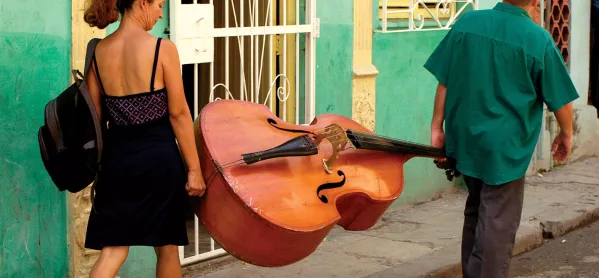Think back to your school music lessons. What do you remember most? Perhaps it is learning to play a wobbly version of Tubular Bells on the keyboard that sticks in your mind, or lugging a violin case back and forth to orchestra rehearsals.
For many of us, music at school revolves around learning to play musical instruments. And for music departments across the country, teaching students to play instruments is an essential part of their work.
In February 2018, Mark Lehain wrote in a piece for Tes about the “life-changing impact” that learning an instrument can have, remembering his own experience of learning the guitar.
There is also increasing evidence that learning an instrument can have a positive impact on academic potential more broadly.
“Learning to play an instrument has demonstrable effects on intelligence and, when children play music together, teaches them about cooperation and working together,” writes Professor Susan Hallam in her report Music Psychology in Education.
But is music education really just about learning to play instruments?
Keeping school music alive
I don’t think so. I think there is far more to this subject than learning scales and chords. And if, as Lehain suggests, we are going to “keep school music alive” in these challenging times of shrinking budgets and increasing accountability, music teachers need to be more vocal about everything that our subject can bring to the table.
How do we do this? I believe that there needs to be a substantial shift in how we think about music education as a society.
At the moment, the government’s national plan for music education states: “Children from all backgrounds and every part of England should have the opportunity to learn a musical instrument; to make music with others; to learn to sing; and to have the opportunity to progress to the next level of excellence if they wish to.”
It also mentions that “the value of music as an academic subject lies in its contribution to enjoyment and enrichment, for its social benefits, for those who engage in music seriously as well as for fun”.
Meanwhile, the Royal Society of Art’s “First Thing Music” project - part of the Learning About Culture initiative, a two-and-a-half year investigation into the role that cultural learning plays in improving educational outcomes for children - seeks to evaluate the impact of the Kodály method, a playful and physical approach to teaching the basics of music. The project looks not at whether pupils become better musicians as a result of Kodály techniques, but what improvements they make in their “academic” studies as a consequence of these musical activities.
This is all very admirable, but the problem with both of these examples is that they reduce music education to being either an enjoyable pastime or something that is there to support other subjects.
‘Obsession with instruments’
When I was speaking to John Finney, former senior lecturer in music education at the University of Cambridge about this, he told me: “When music education is perceived as no more than learning to play a musical instrument, music is no longer a subject of the curriculum where it has a had a distinguished history of opening minds to new worlds of the imagination, to music as a human practice of great significance”.
I’m inclined to agree.
Too often, advocacy for music education reduces it to a skill that is instrumental for improvements in other subjects. And it all comes back to our obsession with instruments. We will not secure the place of music in schools by exclusively seeking sustained instrumental provision, but rather by challenging what we want to achieve through music as a subject.
Music teachers already recognise that music can be more than a contribution to “enjoyment and enrichment”. We just need to find a way to make everyone else see that too.
Steven Berryman is head of music at a girls’ school in Barbican



